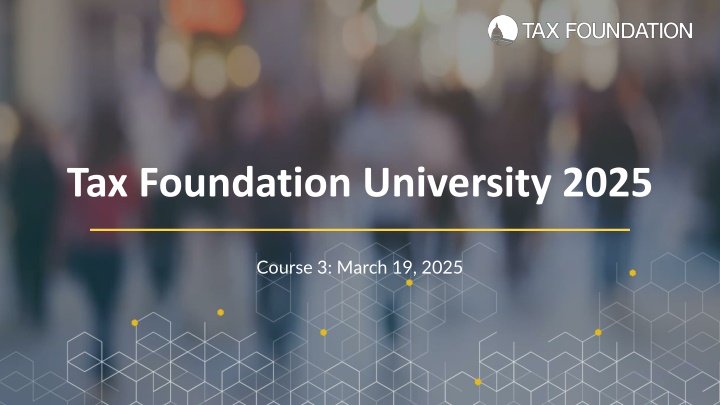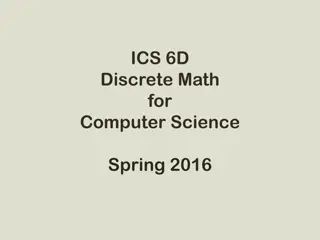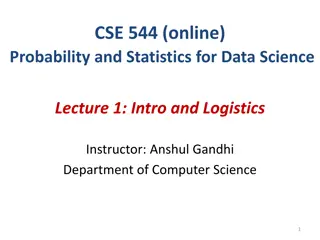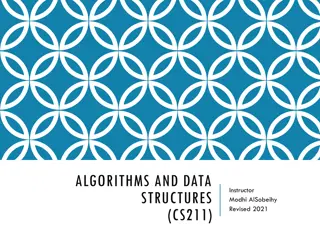
International Tax Policy: Importance, Goals, and Concepts
Explore the significance of international tax policy, including its impact on jobs, multinational companies, and investment. Learn about key topics such as profit shifting, apportionment, and tax concepts related to C-Corporations. Gain insights into the complexities of global taxation systems and the implications for businesses worldwide.
Download Presentation

Please find below an Image/Link to download the presentation.
The content on the website is provided AS IS for your information and personal use only. It may not be sold, licensed, or shared on other websites without obtaining consent from the author. If you encounter any issues during the download, it is possible that the publisher has removed the file from their server.
You are allowed to download the files provided on this website for personal or commercial use, subject to the condition that they are used lawfully. All files are the property of their respective owners.
The content on the website is provided AS IS for your information and personal use only. It may not be sold, licensed, or shared on other websites without obtaining consent from the author.
E N D
Presentation Transcript
Tax Foundation University 2025 Course 3: March 19, 2025
Why Does International Tax Policy Matter? Jobs Multinational companies employ lots of people and pay more Investment MNEs account for a majority of R&D Revenue: More $ when companies want to be US companies More $ when companies want to locate their income in the US TAX FOUNDATION
Goals of this Session Apportionment: how do countries divvy up income? Profit shifting: how do firms try to minimize taxes? Goals of multinational systems: what are we optimizing? TCJA (2017): What did our last reform look like? OECD Global Minimum Tax Agreement: How does it affect us? Next Congress: What are the options? TAX FOUNDATION
Review of Business Tax Concepts C-Corporations: A legal entity that pays tax twice, at the entity level and when profits are distributed to shareholders. Most MNEs are structured as c-corporations. Net Income: A business revenue minus expenses (cost of goods sold, payroll, etc.). The base for the corporate tax. Corporate Income Tax: Tax that c-corporations pay on their net income subject to the 21 percent rate. Deduction: Expenses that reduce taxable income. Foreign Tax Credit: A credit for foreign corporate taxes paid for businesses subject to US tax. Reduces tax (almost) dollar for dollar. TAX FOUNDATION
Apportionment How do we divvy up corporate income when multiple jurisdictions are involved? Source-based: where the economic activity was produced. Residence-based: where the corporation is headquartered. Destination-based: where the activity was consumed. How does the world today work? Source-based is the most common system and tends to take precedence over the others. Some countries, including the U.S., levy some additional residence- based taxes over the top on their companies. Destination-based is situational. Countries might incorporate some destination-based principles to guard against profit shifting. TAX FOUNDATION
Profit Shifting Make a deductible payment from a high-tax jurisdiction to a low-tax jurisdiction. Often easiest when intangibles (roughly, abstract factors of production like brands or patents) are involved. Exploits source-based tax systems. Countries compete on policies other than headline tax rate. Tactics also exist to exploit other tax systems. Residence-based taxes are subject to inversions: use M&A to change residence to get out of residence-based taxes. Destination-based taxes miss quasi-exports like hotels, struggle with e-commerce. TAX FOUNDATION
Goals of Multinational Tax Systems Protect the domestic tax base. Be an attractive place for global investment. Make your home-grown firms competitive abroad. Reduce complexity. TAX FOUNDATION
Tax Cuts and Jobs Act (2017): Prior to TCJA, a 35 percent worldwide (residence-based) corporate income tax with unlimited deferral. Two problems: Companies would defer as long as possible, leading to arguments over money held overseas. Those companies that could not defer would invert to avoid the residence-based taxes. TCJA approach: reverse this entirely. Lower taxes on international income, but assess them immediately. TAX FOUNDATION
TCJAs Carrot and Stick Approach The Stick: Global intangible low-taxed income (GILTI) 10-13.1% rate. No deferral. Rises to 13.1% to 16.4% in 2026. Break for substantive operations, known as qualified basic asset investment. Foreign tax credits The Carrot: Foreign-derived intangible income (FDII) Partner to GILTI with similar attributes in terms of base and rate. Applies to revenue derived from overseas but sourced to the U.S. for tax purposes. Effectively, a low-rate reward for locating easily shiftable income in the U.S. Base erosion and anti-abuse tax (BEAT) Limits base erosion payments as a share of deductions. Effectively, statistical discrimination against a suspicious tax profile. TAX FOUNDATION
OECD Pillar Two Project Global minimum tax rate of 15 percent. Enforced by cascading series of backstops: Qualified domestic minimum top-up tax (QDMTT), a source- based tax where the operations are happening. Income inclusion rule (IIR), the residence-based backstop assessed by the parent country. Undertaxed profits rule (UTPR), an extraterritorial tax. Complexity, rather than liability, causes the most harm to US businesses. TAX FOUNDATION
The Twin Risks of Pillar Two Distributional Effects Ambiguous to U.S. Treasury Foreign tax credits (-) Profit shifting (+) Lower shareholder taxes (-) Negative for U.S. taxpayers Effects happen regardless of US policy; foreign countries are simply allowed to raise their own rates. Fiscal Sovereignty Enforced through extraterritorial UTPR Foreign countries could tax U.S. earnings of U.S. firms U.S. has stated intent to retaliate. TAX FOUNDATION
This Congress: 2025-2026 likely time for tax reform Potentially address scheduled increases in TCJA international provisions (GILTI, FDII, BEAT) D tente with OECD preferable Potential improvements: GILTI expense allocation deserves a second look; may discourage US R&D. BEAT could be better targeted by accounting for double taxation, or by accounting for substance or tax rates in the countries to which payments are made. Tax Foundation research: Considering Potential International Corporate Tax Reforms in the US. TAX FOUNDATION






















